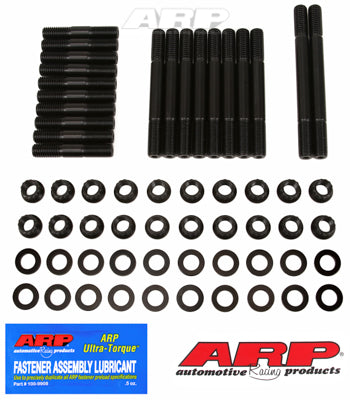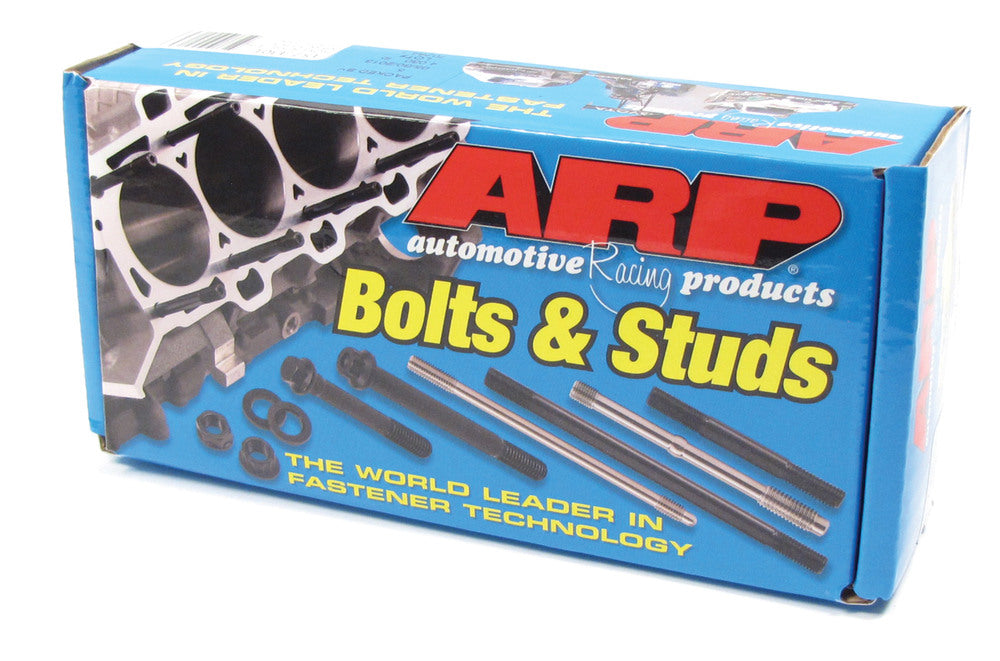

ARP 144-4201 Head Stud Kit for Mopar "A" 12pt
This item is considered special order and is not available for immediate pickup or dispatch. Price and ETA may vary. Please note that no returns, cancellations, or refunds allowed on special orders.
ARP 144-4201 Head Stud Kit for Mopar "A" 12pt
ATOMIC-SHOP UAE
26th Street - Al Quoz Industrial Area 2
Dubai DU
United Arab Emirates
ATOMIC-SHOP UAE (RABDAN Motorsport)
14 10b St - Al Quoz Industrial Area 3
Dubai DU
United Arab Emirates
Choose options
This item is considered special order and is not available for immediate pickup or dispatch. Price and ETA may vary. Please note that no returns, cancellations, or refunds allowed on special orders.
This item is considered special order and is not available for immediate pickup or dispatch. Price and ETA may vary. Please note that no returns, cancellations, or refunds allowed on special orders.
It is for good reason that virtually every top professional engine builder relies on ARP Pro Series head studs for their all-out competition powerplants. Simply stated, there’s not a better stud setup on the market today.
For openers, ARP uses a premium grade 8740 alloy that is rated far superior to “aircraft” quality. Each stud is placed vertically in special racks and precisely heat-treated to 200, 000 psi. This procedure ensures complete heat penetration and the results are far superior to those lesser quality studs from other manufacturers who just dump pieces in a basket and hope for the best.
Following heat-treat, each stud is centerless ground to make it as close to perfectly concentric as possible. This procedure involves about ten very slight cuts and results in an exceptionally straight part. It’s important to note that lesser quality studs are not even centerless ground – the material is thread rolled in bar stock form (mostly before heat-treat, when the material is easier to machine). Because ARP studs are manufactured to such exacting tolerances, you will note that gaskets and cylinder heads literally glide into position and are perfectly aligned – something that won’t happen with inferior quality head studs.
ARP studs are thread rolled after heat-treat, which gives them about 1000% (that’s ten times) better fatigue strength than those studs that are threaded prior to heat-treat (a very common industry practice). It costs a lot more to do it this way, because it’s tough on tooling, but the results are well worth the extra effort.
You will also note that ARP offers specially undercut studs for several engines. This procedure (done only to the shorter studs) more equalizes the “stretch” of both studs, which makes for a more consistent clamping force – and one that compensates for head gasket compression when the cylinder heads are installed. This helps prevent blown head gaskets, and assures optimum engine sealing!
Premium quality heat-treated 8740 chrome moly steel head stud kits are available for most every domestic and import applications.
You won’t find a better quality stud on the market from any other source. Look for ARP stamped on each stud as your assurance of quality.
Clearly, ARP Head Stud/Bolt Kits are the best on the market today, and the favorite of leading professional engine builders in all forms of racing.
HIGH PERFORMANCE SERIES: High Performance head bolts are available with a reduced wrenching hex or 12-point and wide area flanged head that eliminates the need for valve train removal to facilitate cylinder head retorquing. All High Performance Series bolts are 180, 000 psi (which is 15% stronger than Grade 8) and kits come complete with hardened parallel-ground washers.
PRO SERIES: All Pro Series bolts are cold-forged to ensure molecular integrity, heat-treated prior to thread rolling and machining, and are rated nominally at 200, 000 psi. ARP Pro Series head bolt kits are application specific – designed for use with typically competition only components. These fasteners deliver superior strength and meet the ARP “ZERO defect – ZERO failure” quality standard. Hardened and parallel-ground washers are included with each kit to ensure even load distribution and accurate torque readings. All Pro Series head bolts have a reduced wrenching hex or 12-point head and wide area flange to eliminate the need for valve train removal for cylinder head retorquing and permits the use of larger diameter valve springs. Most applications have undercut short bolts that can help eliminate head gasket failures through providing more “stretch” to compensate for the additional compression of gaskets.
Head Studs vs Bolts: On many street-driven vehicles, where master cylinders and other items protrude into the engine compartment, it’s probably necessary to use head bolts so that the cylinder heads can be removed with the engine in the car.
For most applications, however, studs are recommended. And for good reason. Using studs will make it much easier to assemble an engine (especially a racing powerplant which must be serviced frequently and quickly!) with the cylinder head and gasket assured of proper alignment.
Studs also provide more accurate and consistent torque loading. Here’s why. When you use bolts to secure the head, the fastener is actually being “twisted” while it’s being torqued to the proper reading. Accordingly, the bolt is reacting to two different forces simultaneously. A stud should be installed in a “relaxed” mode – never crank it in tightly using a jammed nut.
If everything is right, the stud should be installed finger tight. Then, when applying torque to the nut, the stud will stretch only on the vertical axis. Remember, an undercut shorter stud will have a rate similar to a longer, standard shank stud. This provides a more even clamping force on the head. Because the head gasket will compress upon initial torquing, make sure studs and bolts are re-torqued after the engine has been run.
| Specifications | |
|---|---|
| Socket Size(s) | 9/16 12pt, 3/16 Allen |
Finish: Black oxide
Material: 8740 Chrome Moly
Quantity: Kit
Supported Vehicles:
Chrysler
Cordoba 1975-1983
Fifth Avenue 1983-1989
Imperial 1981-1983
Le Baron 1977-1981
New Yorker 1977-1982
Newport 1974-1981
Town and Country 1978-1981
Valiant 1976-1980
Dodge
330 1964
A100 1964-1970
Aspen 1976-1980
B-Series 1971-1991
CB300 1973-1980
Challenger 1970-1974
Charger 1967-1978
Coronet 1965-1976
Dakota 1989-1991
Dart 1964-1976, 1982
Diplomat 1977-1989
DW Pickup 1967-1991
Magnum 1978-1979, 1982
MB300 1970-1974
Mirada 1980-1983
Monaco 1968-1978
P200 1970-1972
P300 1971-1972
Polara 1966-1973
Power Wagon 1967-1974
R300 1972-1974
Ramcharger 1974-1991
RD200 1978-1980
St. Regis 1979-1981
Plymouth
Barracuda 1964-1974
Belvedere 1964-1971
Caravelle 1978-1989
Duster 1970-1976
Fury 1964-1965, 1967-1978, 1980-1989
GTX 1968
PB-Series 1974-1983
Satellite 1965-1974
Savoy 1964
Scamp 1971-1976
Trailduster 1974-1981
Valiant 1964-1976
VIP 1967
Volare 1976-1980

